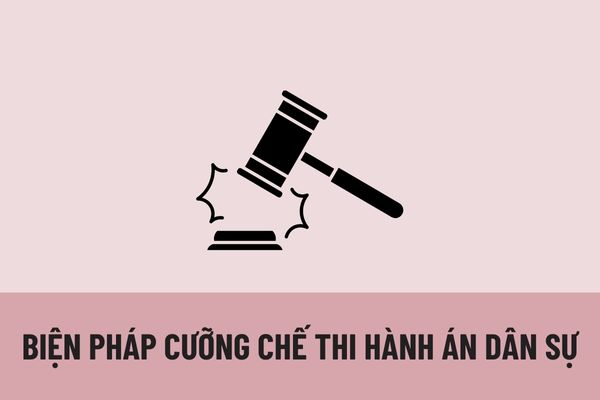What are the measures for enforcing civil judgments? What costs are included in the costs of enforcing civil judgments?
What are the measures to enforce the enforcement of civil judgments?
Under Article 71 of the 2008 Law on Enforcement of Civil Judgments, measures to enforce the enforcement of civil judgments include:
- Deducting money from accounts; recovering and handling money and valuable papers of the judgment debtor.
- Deducting from the income of the judgment debtor.
- Seizing and handling the assets of the judgment debtor, including assets held by a third party.
- Exploiting the assets of the judgment debtor.
- Forcing the transfer of assets, transfer of property rights, and documentation.
- Forcing the judgment debtor to perform or refrain from certain actions.

What are the measures to enforce the enforcement of civil judgments? What does the cost of civil judgment enforcement include?
On what basis is the enforcement of civil judgments executed?
According to the provisions of Article 70 of the 2008 Law on Enforcement of Civil Judgments, the basis for the enforcement of civil judgments is as follows:
The basis for enforcing the execution of civil judgments includes:
- Judgments, decisions;
- Execution decisions;
- Decisions on enforcement, except for judgments and decisions that declare the seizure or freeze of assets and accounts, and the implementation of court decisions on applying emergency measures.
When is the enforcement of civil judgments compelled?
According to Article 46 of the 2008 Law on Enforcement of Civil Judgments:
Compulsory enforcement of judgments
1. When the time limit specified in Clause 1, Article 45 of this Law expires, and the judgment debtor has the ability to enforce the judgment but fails to voluntarily do so, enforcement will be compelled.
2. Enforcement will not be carried out between 10 PM and 6 AM, on weekends, public holidays as specified by law, and other special cases as regulated by the Government of Vietnam.
Compulsory enforcement of civil judgments is carried out when the voluntary enforcement period has expired, and the judgment debtor has the ability to enforce but does not voluntarily comply.
The voluntary enforcement period is 10 days from the date the judgment debtor receives the enforcement decision or is duly notified of the enforcement decision.
What are the costs of enforcing civil judgments and who bears them?
According to Article 73 of the 2008 Law on Enforcement of Civil Judgments (amended by Clause 30, Article 1 of the 2014 Amended Law on Enforcement of Civil Judgments), the costs of enforcing civil judgments are:
The judgment debtor bears the following enforcement costs:
- Costs of notification of enforcement;
- Costs for purchasing materials, fuel, renting vehicles, protective equipment, medical services, firefighting, and other necessary equipment for enforcement;
- Costs for appraisal, valuation, auction of assets; re-valuation costs, except as specified in point a, Clause 2 and point a, Clause 3 of this Article;
- Costs for renting, guarding, preserving assets; costs for loading and transporting assets; labor costs, and other expenses for building barriers, demolishing structures; costs for measuring, determining boundaries for enforcement purposes;
The judgment creditor bears the following enforcement costs:
- Costs of re-valuation if the judgment creditor requests re-valuation, unless the re-valuation is due to violations in the valuation process;
- A portion or all costs of building barriers and demolishing structures if the judgment specifies that the judgment creditor must bear these costs.
The state budget covers enforcement costs in the following cases:
- Re-valuation of assets due to violations in the valuation process;
- Costs for verifying enforcement conditions;
- Other necessary costs as regulated by the Government of Vietnam;
- Cases where the parties are exempted or reduced enforcement costs as specified by law.
The enforcement officer estimates the enforcement costs and notifies the judgment debtor at least 03 working days before the scheduled enforcement date, except in cases where immediate enforcement is necessary. Enforcement costs are initially covered by the state budget.
Enforcement costs are paid based on the actual, reasonable expenses approved by the head of the civil judgment enforcement agency as proposed by the enforcement officer.
The head of the civil judgment enforcement agency where the enforcement is organized reviews and decides on the exemption or reduction of enforcement costs.
Enforcement costs are paid by the parties involved or deducted from the proceeds or auctioned assets, including assets held by third parties. After handling the assets or collecting money, the enforcement officer must immediately proceed with refunding the funds initially advanced. The Government of Vietnam regulates the allowances for individuals directly involved in enforcement and protection; the procedures for collecting, paying, exempting, and reducing enforcement costs.
LawNet